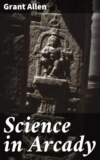Loe raamatut: «The Beckoning Hand, and Other Stories»
PREFACE
Of the thirteen stories included in this volume, "The Gold Wulfric," "The Two Carnegies," and "John Cann's Treasure" originally appeared in the pages of the Cornhill; "The Third Time" and "The Search Party's Find" are from Longman's Magazine; "Harry's Inheritance" first saw the light in the English Illustrated; and "Lucretia," "My Uncle's Will," "Olga Davidoff's Husband," "Isaline and I," "Professor Milliter's Dilemma," and "In Strict Confidence," obtained hospitable shelter between the friendly covers of Belgravia. My title-piece, "The Beckoning Hand," is practically new, having only been published before as the Christmas supplement of a provincial newspaper. My thanks are due to Messrs. Smith and Elder, Longmans, Macmillan, and Chatto and Windus for kind permission to reprint most of the stories here. If anybody reads them and likes them, let me take this opportunity (as an unprejudiced person) of recommending to him my other volume of "Strange Stories," which I consider every bit as gruesome as this one. Should I succeed in attaining the pious ambition of the Fat Boy, and "making your flesh creep," then, as somebody once remarked before, "this work will not have been written in vain."
G. A.
The Nook, Dorking,
Christmas Day, 1886.
THE BECKONING HAND
I
I first met Césarine Vivian in the stalls at the Ambiguities Theatre.
I had promised to take Mrs. Latham and Irene to see the French plays which were then being acted by Marie Leroux's celebrated Palais Royal company. I wasn't at the time exactly engaged to poor Irene: it has always been a comfort to me that I wasn't engaged to her, though I knew Irene herself considered it practically equivalent to an understood engagement. We had known one another intimately from childhood upward, for the Lathams were a sort of second cousins of ours, three times removed: and we had always called one another by our Christian names, and been very fond of one another in a simple girlish and boyish fashion as long as we could either of us remember. Still, I maintain, there was no definite understanding between us; and if Mrs. Latham thought I had been paying Irene attentions, she must have known that a young man of two and twenty, with a decent fortune and a nice estate down in Devonshire, was likely to look about him for a while before he thought of settling down and marrying quietly.
I had brought the yacht up to London Bridge, and was living on board in picnic style, and running about town casually, when I took Irene and her mother to see "Faustine," at the Ambiguities. As soon as we had got in and taken our places, Irene whispered to me, touching my hand lightly with her fan, "Just look at the very dark girl on the other side of you, Harry! Did you ever in your life see anybody so perfectly beautiful?"
It has always been a great comfort to me, too, that Irene herself was the first person to call my attention to Césarine Vivian's extraordinary beauty.
I turned round, as if by accident, and gave a passing glance, where Irene waved her fan, at the girl beside me. She was beautiful, certainly, in a terrible, grand, statuesque style of beauty; and I saw at a glimpse that she had Southern blood in her veins, perhaps Negro, perhaps Moorish, perhaps only Spanish, or Italian, or Provençal. Her features were proud and somewhat Jewish-looking; her eyes large, dark, and haughty; her black hair waved slightly in sinuous undulations as it passed across her high, broad forehead; her complexion, though a dusky olive in tone, was clear and rich, and daintily transparent; and her lips were thin and very slightly curled at the delicate corners, with a peculiarly imperious and almost scornful expression of fixed disdain. I had never before beheld anywhere such a magnificently repellent specimen of womanhood. For a second or so, as I looked, her eyes met mine with a defiant inquiry, and I was conscious that moment of some strange and weird fascination in her glance that seemed to draw me irresistibly towards her, at the same time that I hardly dared to fix my gaze steadily upon the piercing eyes that looked through and through me with their keen penetration.
"She's very beautiful, no doubt," I whispered back to Irene in a low undertone, "though I must confess I don't exactly like the look of her. She's a trifle too much of a tragedy queen for my taste: a Lady Macbeth, or a Beatrice Cenci, or a Clytemnestra. I prefer our simple little English prettiness to this southern splendour. It's more to our English liking than these tall and stately Italian enchantresses. Besides, I fancy the girl looks as if she had a drop or two of black blood somewhere about her."
"Oh, no," Irene cried warmly. "Impossible, Harry. She's exquisite: exquisite. Italian, you know, or something of that sort. Italian girls have always got that peculiar gipsy-like type of beauty."
Low as we spoke, the girl seemed to know by instinct we were talking about her; for she drew away the ends of her light wrap coldly, in a significant fashion, and turned with her opera-glass in the opposite direction, as if on purpose to avoid looking towards us.
A minute later the curtain rose, and the first act of Halévy's "Faustine" distracted my attention for the moment from the beautiful stranger.
Marie Leroux took the part of the great empress. She was grand, stately, imposing, no doubt, but somehow it seemed to me she didn't come up quite so well as usual that evening to one's ideal picture of the terrible, audacious, superb Roman woman. I leant over and murmured so to Irene. "Don't you know why?" Irene whispered back to me with a faint movement of the play-bill toward the beautiful stranger.
"No," I answered; "I haven't really the slightest conception."
"Why," she whispered, smiling; "just look beside you. Could anybody bear comparison for a moment as a Faustine with that splendid creature in the stall next to you?"
I stole a glance sideways as she spoke. It was quite true. The girl by my side was the real Faustine, the exact embodiment of the dramatist's creation; and Marie Leroux, with her stagey effects and her actress's pretences, could not in any way stand the contrast with the genuine empress who sat there eagerly watching her.
The girl saw me glance quickly from her towards the actress and from the actress back to her, and shrank aside, not with coquettish timidity, but half angrily and half as if flattered and pleased at the implied compliment. "Papa," she said to the very English-looking gentleman who sat beyond her, "ce monsieur-ci…" I couldn't catch the end of the sentence.
She was French, then, not Italian or Spanish; yet a more perfect Englishman than the man she called "papa" it would be difficult to discover on a long summer's day in all London.
"My dear," her father whispered back in English, "if I were you…" and the rest of that sentence also was quite inaudible to me.
My interest was now fully roused in the beautiful stranger, who sat evidently with her father and sister, and drank in every word of the play as it proceeded with the intensest interest. As for me, I hardly cared to look at the actors, so absorbed was I in my queenly neighbour. I made a bare pretence of watching the stage every five minutes, and saying a few words now and again to Irene or her mother; but my real attention was all the time furtively directed to the girl beside me. Not that I was taken with her; quite the contrary; she distinctly repelled me; but she seemed to exercise over me for all that the same strange and indescribable fascination which is often possessed by some horrible sight that you would give worlds to avoid, and yet cannot for your life help intently gazing upon.
Between the third and fourth acts Irene whispered to me again, "I can't keep my eyes off her, Harry. She's wonderfully beautiful. Confess now: aren't you over head and ears in love with her?"
I looked at Irene's sweet little peaceful English face, and I answered truthfully, "No, Irene. If I wanted to fall in love, I should find somebody – "
"Nonsense, Harry," Irene cried, blushing a little, and holding up her fan before her nervously. "She's a thousand times prettier and handsomer in every way – "
"Prettier?"
"Than I am."
At that moment the curtain rose, and Marie Leroux came forward once more with her imperial diadem, in the very act of defying and bearding the enraged emperor.
It was a great scene. The whole theatre hung upon her words for twenty minutes. The effect was sublime. Even I myself felt my interest aroused at last in the consummate spectacle. I glanced round to observe my neighbour. She sat there, straining her gaze upon the stage, and heaving her bosom with suppressed emotion. In a second, the spell was broken again. Beside that tall, dark southern girl, in her queenly beauty, with her flashing eyes and quivering nostrils, intensely moved by the passion of the play, the mere actress who mouthed and gesticulated before us by the footlights was as sounding brass and a tinkling cymbal. My companion in the stalls was the genuine Faustine: the player on the stage was but a false pretender.
As I looked a cry arose from the wings: a hushed cry at first, a buzz or hum; rising louder and ever louder still, as a red glare burst upon the scene from the background. Then a voice from the side boxes rang out suddenly above the confused murmur and the ranting of the actors "Fire! Fire!"
Almost before I knew what had happened, the mob in the stalls, like the mob in the gallery, was surging and swaying wildly towards the exits, in a general struggle for life of the fierce old selfish barbaric pattern. Dense clouds of smoke rolled from the stage and filled the length and breadth of the auditorium; tongues of flame licked up the pasteboard scenes and hangings, like so much paper; women screamed, and fought, and fainted; men pushed one another aside and hustled and elbowed, in one wild effort to make for the doors at all hazards to the lives of their neighbours. Never before had I so vividly realized how near the savage lies to the surface in our best and highest civilized society. I had to realize it still more vividly and more terribly afterwards.
One person alone I observed calm and erect, resisting quietly all pushes and thrusts, and moving with slow deliberateness to the door, as if wholly unconcerned at the universal noise and hubbub and tumult around her. It was the dark girl from the stalls beside me.
For myself, my one thought of course was for poor Irene and Mrs. Latham. Fortunately, I am a strong and well-built man, and by keeping the two women in front of me, and thrusting hard with my elbows on either side to keep off the crush, I managed to make a tolerably clear road for them down the central row of stalls and out on to the big external staircase. The dark girl, now separated from her father and sister by the rush, was close in front of me. By a careful side movement, I managed to include her also in our party. She looked up to me gratefully with her big eyes, and her mouth broke into a charming smile as she turned and said in perfect English, "I am much obliged to you for your kind assistance." Irene's cheek was pale as death; but through the strange young lady's olive skin the bright blood still burned and glowed amid that frantic panic as calmly as ever.
We had reached the bottom of the steps, and were out into the front, when suddenly the strange lady turned around and gave a little cry of disappointment. "Mes lorgnettes! Mes lorgnettes!" she said. Then glancing round carelessly to me she went on in English: "I have left my opera-glasses inside on the vacant seat. I think, if you will excuse me, I'll go back and fetch them."
"It's impossible," I cried, "my dear madam. Utterly impossible. They'll crush you underfoot. They'll tear you to pieces."
She smiled a strange haughty smile, as if amused at the idea, but merely answered, "I think not," and tried to pass lightly by me.
I held her arm. I didn't know then she was as strong as I was. "Don't go," I said imploringly. "They will certainly kill you. It would be impossible to stem a mob like this one."
She smiled again, and darted back in silence before I could stop her.
Irene and Mrs. Latham were now fairly out of all danger. "Go on, Irene," I said loosing her arm. "Policeman, get these ladies safely out. I must go back and take care of that mad woman."
"Go, go quick," Irene cried. "If you don't go, she'll be killed, Harry."
I rushed back wildly after her, battling as well as I was able against the frantic rush of panic-stricken fugitives, and found my companion struggling still upon the main staircase. I helped her to make her way back into the burning theatre, and she ran lightly through the dense smoke to the stall she had occupied, and took the opera-glasses from the vacant place. Then she turned to me once more with a smile of triumph. "People lose their heads so," she said, "in all these crushes. I came back on purpose to show papa I wasn't going to be frightened into leaving my opera-glasses. I should have been eternally ashamed of myself if I had come away and left them in the theatre."
"Quick," I answered, gasping for breath. "If you don't make haste, we shall be choked to death, or the roof itself will fall in upon us and crush us!"
She looked up where I pointed with a hasty glance, and then made her way back again quickly to the staircase. As we hurried out, the timbers of the stage were beginning to fall in, and the engines were already playing fiercely upon the raging flames. I took her hand and almost dragged her out into the open. When we reached the Strand, we were both wet through, and terribly blackened with smoke and ashes. Pushing our way through the dense crowd, I called a hansom. She jumped in lightly. "Thank you so much," she said, quite carelessly. "Will you kindly tell him where to drive? Twenty-seven, Seymour Crescent."
"I'll see you home, if you'll allow me," I answered. "Under these circumstances, I trust I may be permitted."
"As you like," she said, smiling enchantingly. "You are very good. My name is Césarine Vivian. Papa will be very much obliged to you for your kind assistance."
I drove round to the Lathams' after dropping Miss Vivian at her father's door, to assure myself of Irene's safety, and to let them know of my own return unhurt from my perilous adventure. Irene met me on the doorstep, pale as death still. "Thank heaven," she cried, "Harry, you're safe back again! And that poor girl? What has become of her?"
"I left her," I said, "at Seymour Crescent."
Irene burst into a flood of tears. "Oh, Harry," she cried, "I thought she would have been killed there. It was brave of you, indeed, to help her through with it."
II
Next day, Mr. Vivian called on me at the Oxford and Cambridge, the address on the card I had given his daughter. I was in the club when he called, and I found him a pleasant, good-natured Cornishman, with very little that was strange or romantic in any way about him. He thanked me heartily, but not too effusively, for the care I had taken of Miss Vivian overnight; and he was not so overcome with parental emotion as not to smoke a very good Havana, or to refuse my offer of a brandy and seltzer. We got on very well together, and I soon gathered from what my new acquaintance said that, though he belonged to one of the best families in Cornwall, he had been an English merchant in Haiti, and had made his money chiefly in the coffee trade. He was a widower, I learned incidentally, and his daughters had been brought up for some years in England, though at their mother's request they had also passed part of their lives in convent schools in Paris and Rouen. "Mrs. Vivian was a Haitian, you know," he said casually: "Catholic of course. The girls are Catholics. They're good girls, though they're my own daughters; and Césarine, your friend of last night, is supposed to be clever. I'm no judge myself: I don't know about it. Oh, by the way, Césarine said she hadn't thanked you half enough herself yesterday, and I was to be sure and bring you round this afternoon to a cup of tea with us at Seymour Crescent."
In spite of the impression Mdlle. Césarine had made upon me the night before, I somehow didn't feel at all desirous of meeting her again. I was impressed, it is true, but not favourably. There seemed to me something uncanny and weird about her which made me shrink from seeing anything more of her if I could possibly avoid it. And as it happened, I was luckily engaged that very afternoon to tea at Irene's. I made the excuse, and added somewhat pointedly – on purpose that it might be repeated to Mdlle. Césarine – "Miss Latham is a very old and particular friend of mine – a friend whom I couldn't for worlds think of disappointing."
Mr. Vivian laughed the matter off. "I shall catch it from Césarine," he said good-humouredly, "for not bringing her cavalier to receive her formal thanks in person. Our West-Indian born girls, you know, are very imperious. But if you can't, you can't, of course, so there's an end of it, and it's no use talking any more about it."
I can't say why, but at that moment, in spite of my intense desire not to meet Césarine again, I felt I would have given whole worlds if he would have pressed me to come in spite of myself. But, as it happened, he didn't.
At five o'clock, I drove round in a hansom as arranged, to Irene's, having almost made up my mind, if I found her alone, to come to a definite understanding with her and call it an engagement. She wasn't alone, however. As I entered the drawing-room, I saw a tall and graceful lady sitting opposite her, holding a cup of tea, and with her back towards me. The lady rose, moved round, and bowed. To my immense surprise, I found it was Césarine.
I noted to myself at the moment, too, that in my heart, though I had seen her but once before, I thought of her already simply as Césarine. And I was pleased to see her: fascinated: spell-bound.
Césarine smiled at my evident surprise. "Papa and I met Miss Latham this afternoon in Bond Street," she said gaily, in answer to my mute inquiry, "and we stopped and spoke to one another, of course, about last night; and papa said you couldn't come round to tea with us in the Crescent, because you were engaged already to Miss Latham. And Miss Latham very kindly asked me to drive over and take tea with her, as I was so anxious to thank you once more for your great kindness to me yesterday."
"And Miss Vivian was good enough to waive all ceremony," Irene put in, "and come round to us as you see, without further introduction."
I stopped and talked all the time I was there to Irene; but, somehow, whatever I said, Césarine managed to intercept it, and I caught myself quite guiltily looking at her from time to time, with an inexpressible attraction that I could not account for.
By-and-by, Mr. Vivian's carriage called for Césarine, and I was left a few minutes alone with Irene.
"Well, what do you think of her?" Irene asked me simply.
I turned my eyes away: I dare not meet hers. "I think she's very handsome," I replied evasively.
"Handsome! I should think so. She's wonderful. She's splendid. And doesn't she talk magnificently, too, Harry?"
"She's clever, certainly," I answered shuffling. "But I don't know why, I mistrust her, Irene."
I rose and stood by the door with my hat in my hand, hesitating and trembling. I felt as if I had something to say to Irene, and yet I was half afraid to venture upon saying it. My fingers quivered, a thing very unusual with me. At last I came closer to her, after a long pause, and said, "Irene."
Irene started, and the colour flushed suddenly into her cheeks. "Yes, Harry," she answered tremulously.
I don't know why, but I couldn't utter it. It was but to say "I love you," yet I hadn't the courage. I stood there like a fool, looking at her irresolutely, and then —
The door opened suddenly, and Mrs. Latham entered and interrupted us.




















